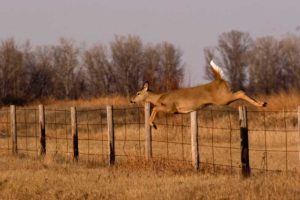When I put Database technology down, I run a 20-acre farm with my family. I love it. It’s fun watching the kids learn from the experience. Learning my life lessons and illustrations from the chores and animals is fun.
A farm scare today made me think of you. There is a lesson for us all that I hope my animals never learn. One of our boys ran in shouting, “The cows! The cows! They are trying to get out! They are pushing on the gate!”. I ran out there to see it was a misunderstanding. The boys heard a noise, saw the position of the cows, and assumed the worst. All was well. (It almost turned into a “parent of young children” fear when I saw it was the bull and one of the cows (that means female) over in that corner together… ) But it reminded me of my greatest fear of raising farm animals in a suburban/rural town near busy roads. I think you and I can benefit from understanding my fear here. I’ll tell you my worries and help you with one condition: you can’t tell my animals this lesson. It is only for us.
You are free
That’s the lesson. Rather than bury the lede, that’s the lesson. You’re free. In many contexts and many ways – you are free. Now that I’ve spilled the beans, you’re free to stop reading and have the next few minutes back if you like. You’re free, after all.
The lesson I hope the animals never learn.
In short, They are free.
My fences are all psychological. Our cows are small for cows but big for fences. Our bull weighs about 1,250 pounds. While we spent a lot of money on our fences, the bull could leave in a few ways:
- He can walk through the electric fences. On a good day, the fence is about 8,000 volts. That sounds high, and it is, but it’s pulsating. I’ve touched it and will touch it again, I’m sure, and am alive with no (new) deficiencies (that I’m aware of). Animals can charge through it.
- He could knock down the woven wire fences if he charged them.
- He could push with his weight on the many gates to the outside
- He could step on the gate with his front legs and crush it to the ground.
The goats and sheep can jump over in some areas. They could run through the electric strands on some days. When their coats are full, the sheep could walk through the high-tensile strands and possibly not feel a zap. They all could leave.
Thankfully, most don’t. But it’s a fear. This sense that the animals could discover something fairly apparent to you by now. They could find that they are free.
It’s said that when captive elephants are young, their trainers tie them to big chains. Those chains won’t go anywhere when they move them. They spend their young years learning, “When I am tied up, I can kick all I want; I’m not going anywhere.” It’s also said that they don’t need big chains to hold them when they are older. A rope tied to a small post will do. They don’t know they are free.
I don’t want my animals to learn they are free. People who raise farm animals often suggest getting rid of an animal who knows they are free; It’s contagious.
The lesson I hope you are starting to learn.
I already told you above, so this isn’t a big reveal. In short, You are free.
I told you why our farm animals are really free. I told you about the holes in the system they aren’t aware of yet. Let me tell you some reasons they stay, though. When you read these, think of yourself and your current situation:
- Contentment – They have hay or grains. They have water. They get treats. Their humans love and care for them. They don’t know if this is all they need or want; it’s all they know, and it works.
- Self-awareness – They have “imposter syndrome” – they don’t know they can get out. They believe they are not free.
- Role Models – None of the other animals model escapist tendencies. Well, not in the ones we have today.
- Laziness – Let’s face it, they walk to the fence, see it, give up, and return to the easy stuff.

It must look weird to those animals when a deer jumps over the fence and runs around in the field before jumping out. Thankfully, it’s not frequent enough to model the behavior. I sometimes wonder, if the animals possessed rationality, would they think those deer to be strange and problematic fools?
This is about you, though. You are free. Right now. You are free. I mostly speak of career, growth, learning, and development with this post. And there are many dimensions of the word “free”; sometime, over coffee, I can discuss a few with you.
For now. Think of your career and your day job, and your advancement. Maybe you think your gender is keeping you down because that’s the fence that’s been put around you by society or your team. Perhaps you think, “I’ll never be able to speak at a conference because of, ” and then list a bunch of barriers like the gate being there, or the hay being tastiest where you are, or not being expert enough in availability groups to dare speak at a local user group about the topic.
Knock it off. I’m not giving you some “new age” power of positive thinking self-help thing here, but… Knock it off. There are valid limitations. I can’t be a star .net developer tomorrow or in 3 months. However, if I wanted to join the dark side, become a developer, and focus on it for a few years, I could do a decent job and become better than average. I’m not talented or extra bright; I know that consistent effort leads to progress and that I have systems for learning and using technology. I trust you could do it also. But Knock it off. Stop giving these bad excuses space to germinate. Stop watching the other fence dwellers for your cues.
Again – being a fence dweller isn’t bad. What I mean is – don’t limit yourself. Don’t limit your potential because of fake circumstances. Work harder, see beyond the fence, and work towards your outcomes. Will you always succeed? Nope. So knock that “But what if I fail?!!” barrier out of your way quickly; you will sometimes fail. I’ve been laid off a few times. I dropped out of High school. I had a lengthy business partnership that fizzled and died at the end; I’ve sat there looking at the books before wondering, “Hmm. is it time to go find that good hay inside a safer fence?” I’ve realized that I didn’t have a connection with a client and had to move on from the relationship; I’ve messed up farming in more ways than I can count. Don’t even talk about my failures on the journey!
You’ll have failures, too. Safety, food, water, and generally kind shepherds are inside the fence. Outside are cars, predator animals, weather patterns, and pesky humans. You can stay inside that fence, and that’s a great option – whatever your wall is. But know, you are free.


Thank you. Great read, well written.
Thank you Heidi! Appreciate the kind words. Glad you enjoyed it.
Thanks for the great article.
“I sometimes wonder, if the animals possessed rationality…” This is a strange statement. I know Rene Descartes thought animals were not rational and experimented upon dogs while they were fully conscious but I think we have come a long way from that. The scientific evidence seems pretty clear that animals are rational so it is odd to see a statement like that in 2017.
http://www.huffingtonpost.com/david-ropeik/humans-or-non-human-anima_b_8052124.html
Other than that I really liked it.
Thanks for the great comment. Glad you enjoyed the post. It is clear animals possess intelligence in varying capacity among the species, even exhibit some decision-making skills and learned behaviors, the fence examples being one. I’m not attempting to take away from these things with that quoted comment. I think that article goes a bit too far, even if it is 2017, but I see your point for sure. I more meant – the ability to look at the deer, see it try it and judge the deer’s actions as foolish and then sort of scornfully think “Fool!” – I do think that that’s a bit of a stretch. But happy to discuss this in an e-mail. I don’t want to take the comments down the path of the comments on the HuffPo piece. 🙂 Thanks again for checking this out.
excellent article. Good job man. I was inspired…
Thanks.
Enjoyed the article. The reminder of our own freedom is appreciated. It’s easy being content and staring in awe as my fellow animals (co-workers) jump the fence and leave pasture (company) or the field (I.T.).
Thanks Andy! I love the appropriation of the illustration elements there. I wasn’t even thinking of the field one 🙂
Great reading Mike… I saw you presentation at groupby.org and it was super fun too.
I think the great differentiating factor here is the ability to accept failure. We live in a society that does not embrace the idea of failure as a learning opportunity. I have a six year old girl and I know that as a father, sometimes (even without being aware) I gravitate towards avoiding exposing my little one to do things she is not ready to do because “it is frustrating for her” as opposed to encourage her to try, even if she fails… to learn in the process. And this is just one example of many.
I don’t know why… maybe it’s part of our genetic code and is a trait that our species need for survival, but most humans reject (and are afraid) of failure … but avoiding failure at all costs is a recipe for mediocrity.
Maybe humans 2.0 will understand that… hehehe..
Great stuff, Martin! Fully agree. This post here you are commenting on was actually a favorite to write for some reason, really feel passionate about it – sort of like a lesson that came to me instead of one I went searching for. Another post in that same category is this series here about failure: https://straightpathsql.com/archives/2010/05/plan-to-fail-for-succes/ – it’s a little bit of a different angle – more on failure prevention, but in the two parts I hit on why failure really isn’t the end of the world. I think the problem in our makeup you are looking for may just be good, old-fashioned pride, though 🙂
Needed this today. Well written and inspiring. Thank you!
Marie. Thanks for that comment. That’s a humbling comment to read and I appreciate it! Have a good day and break out of those fences! 😉
Excellent read. I as well, am a SQL Server consultant just starting out of college about 1.5 years ago. So far, so good and articles like this keep my head up. Thanks for sharing!
Cool Cory! Thanks for sharing and sounds like a fun journey. Send me an e-mail sometime, I’d love to hear how the consulting road is going for you.